Neem oil is an effective, all-natural insecticide, and it’s great for controlling and repelling bugs that eat your plants. You can use it both indoors on your houseplants or outside in the garden.
Not only does it work to prevent pest infestations, you can also use it to control disease and fungus outbreaks. I’ve been using it for decades, so I know first had just how much of a game changer it is. Trust me, it will be your new best friend!
In this post I will tell you all you need to know, and show you how to use neem oil on your plants. You’ll learn exactly what it is, which pests and diseases it works on, when, how much, and how often to apply it, and I’ll even show you how to make your own spray using my easy recipe.
The oil is extracted from the tree seeds, and is either sold in its pure form, or mixed with other ingredients to make pesticide and fungicide sprays.
It is not a poison, and it’s non-toxic to humans, cats, and dogs, so it’s safe to use both indoors and outdoors. That’s why it’s also commonly used in beauty and health care products.
How Does Neem Oil Work?
Basically, the way it works as a pesticide is that it messes with the brains and hormones of the bugs that eat it. It causes them to stop feeding and mating, and they will eventually die off. It also works to smother them on contact, which kills them faster.
In addition to killing insect pests, neem oil repels them, and it has a slight residual effect to keep them away longer than other organic methods.
The best part is that it only kills the ones that eat plants, so it won’t harm beneficial insects (as long as you don’t spray it directly on them).
Neem oil won’t kill all of the bugs on contact, so it might take a few days, weeks, or even months for them to disappear from the plant completely.
Other Neem Oil Uses For Plants
Beside using it to control pests, neem oil also works as a fungicide, so it can help prevent and fight plant diseases. It doesn’t cure them, but it stops them from getting worse.
The way it works is it prevents the spores from spreading. So it won’t always completely eliminate the fungus or disease, but it can reduce the spread so your plant will be able to keep growing. Here are some common ones it works on:
- Powdery mildew
- Blackspot
- Rust
- Leaf spot
- Blight
- …and more
Related Post: How To Debug Plants Before Bringing Them Indoors
What Kind Of Bugs Does Neem Oil Kill?
Neem oil works to kill all types of houseplant bugs, and it has helped me get rid of every single one I’ve ever dealt with. It also works to control destructive plant-eating garden pests outside. Here are a few examples:
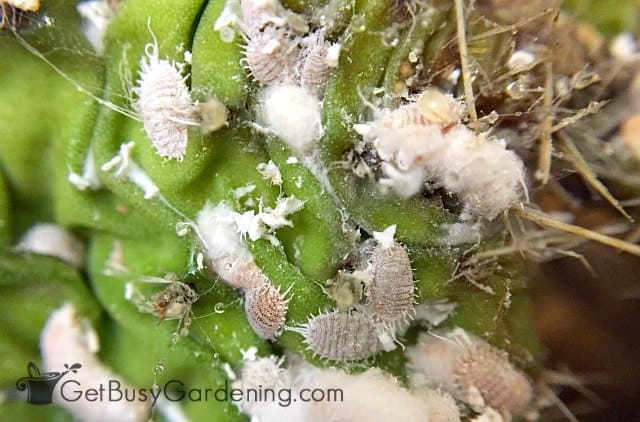
Precautions
While it’s not harmful to furry pets or humans, there are a couple of precautions you should take before using neem oil on your plants:
- Some plants are sensitive – Though it’s not very common, some plants are sensitive to any type of sprays, even neem oil. So always test it on one or two leaves and let it sit for 24 hours to make sure it doesn’t damage them.
- Use caution around beneficial bugs – Please remember that all forms of pesticides, including natural ones, should be used with care. Always follow the instructions on the label, and never spray it directly on or nearby any beneficial insects.
- Don’t use it around fish – It can be toxic to fish and amphibians, so don’t use it around a pond, fish tank, or other areas where these creatures live.
- Be careful what you buy – Some brands sell neem oil products with lots of other chemicals mixed in. So always be sure to read the label, because some of the additives can be much more toxic, and are not made for organic gardening.
How To Make Neem Oil Spray For Plants
You can buy neem oil based pesticides in pre-made sprays, or you can make your own using a pure organic concentrate for plants.
I prefer to make my own because I can control the ingredients, so I know there’s no chemicals or harsh ingredients mixed in. Here’s my recipe and instructions:
My Neem Oil Spray Recipe
- 1 ½ teaspoons pure organic neem oil concentrate
- 1 teaspoon mild liquid soap*
- 1 liter tepid water
Mixing Instructions
If you bought a different brand of pure neem oil concentrate than what I’ve listed above, read the label to make sure there aren’t any special directions for mixing it.
To make my recipe, mix all of the ingredients into a spray bottle and shake well. You can use it on your plants right away, or it will last for a few weeks in the bottle. Be sure to shake it well each time you use it.
*The soap helps the oil mix with water, since they don’t mix well on their own, so don’t skip it. It also has the added benefit of killing bugs on contact, so you should start seeing an improvement right away.
How To Use Neem Oil On Plants
It’s easy to use neem oil on your indoor or outdoor plants, but it’s important to know the right time to apply it, as well as how to do it for the best results.
Below I will discuss exactly when and how to spray it, and give you step by step instructions.
When To Spray Neem Oil
It doesn’t matter when you use it indoors on your houseplants, you can apply it any time of the year, day or night.
But outdoors, it’s best to use it either in the early morning or late evening so you don’t have to worry so much about harming beneficial bugs.
Also, don’t apply it in the full sun, because neem oil can make the leaves more sensitive to sunburn.
So if you can’t spray it in the morning or move your plant to the shade, then do it on a cloudy day. Once it’s dry it will no longer pose a threat.
How To Apply Neem Oil
Applying neem oil to your plants is pretty straight forward, but you should follow these steps so that you do it the right way:
- Test it on a leaf or two to make sure there’s no damage before using it on the whole plant.
- Spray the entire plant with, getting both the top and bottom of the leaves.
- Keep the plant out of direct sunlight until the leaves are dry.
- Continue to use neem oil every week until you no longer see any signs of the bugs or disease.
Additional Tips For Applying Neem Oil
I wanted to mention a few other key tips about applying neem oil on your plants so that you will have the best possible success using it. Here are some additional pointers:
- For best results, be sure to douse your plant until it’s dripping wet, and get into every nook and cranny that you can.
- I recommend moving houseplants to a shower or sink, or outside if it’s warm enough, to avoid making a mess indoors.
- It’s not likely that you’ll get rid of an insect pest infestation with one application, so you have to be persistent.
- You can also use neem oil as a drench to kill annoying bugs in the soil as well, just take care not to overwater your plant in the process.
Related Post: Fungus Gnats vs Fruit Flies: What’s The Difference?
How Often To Apply Neem Oil
You should spray your plant with neem oil weekly until you no longer see any bugs. If you have one that’s plagued by recurring infestations, then use it monthly as a preventive treatment.
For fungus and disease control, it’s best to start applying it to your most susceptible plants at the beginning of the season, or as soon as you see symptoms. Then spray it weekly to stop the spread.
Remember that neem oil has a slight residual effect, so you don’t have to treat your plant every day like you would with other natural insect pest control methods.
FAQs
To me neem oil smells nutty. While it has a strong and distinct odor, it’s not unpleasant. But some people don’t like it, and they think it smells bad. So it may be different depending on the specific brand you buy. The aroma is short-lived and goes away once it dries.
How long does neem oil take to work?
It takes a few days for neem oil to start working once the bugs eat it. But it also smothers some of them on contact, so you should begin to see an improvement right away.
If you have never used neem oil to kill bugs on your plants, I highly recommend trying it. It’s by far one of the best natural pest control methods I’ve ever used.
If you’re struggling to keep bugs off your indoor plants, then my Houseplant Pest Control eBook is for you. It will show you how to identify which one is infesting your plant, and show you exactly how to get rid of it FOR GOOD! Download your copy today!
More About Houseplant Pests
Have you ever tried using neem oil on plants? Share your experiences in the comments below.
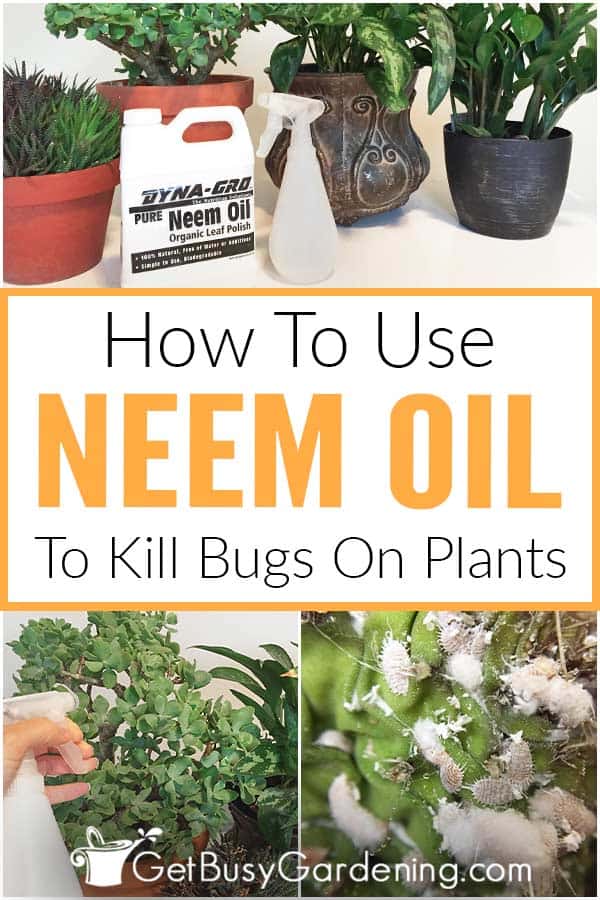
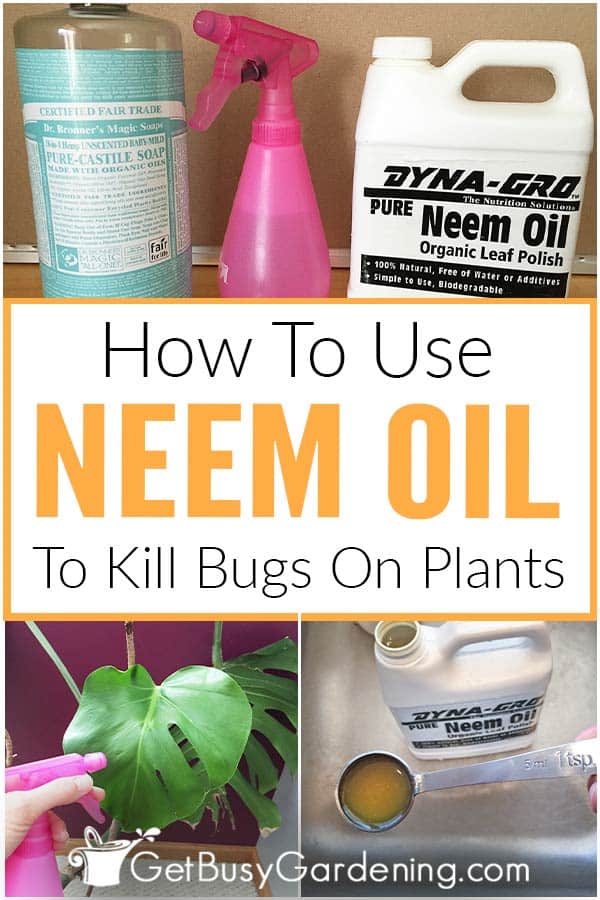
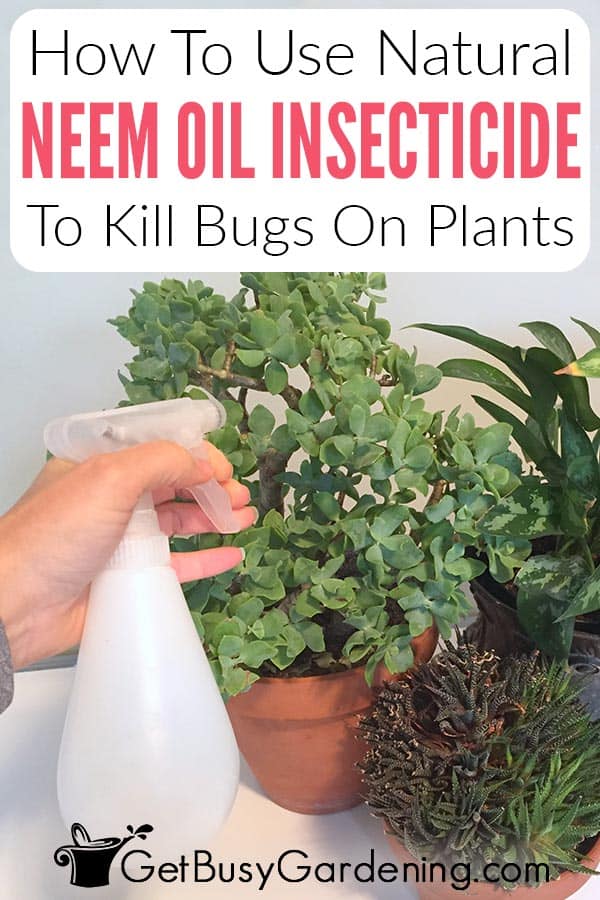
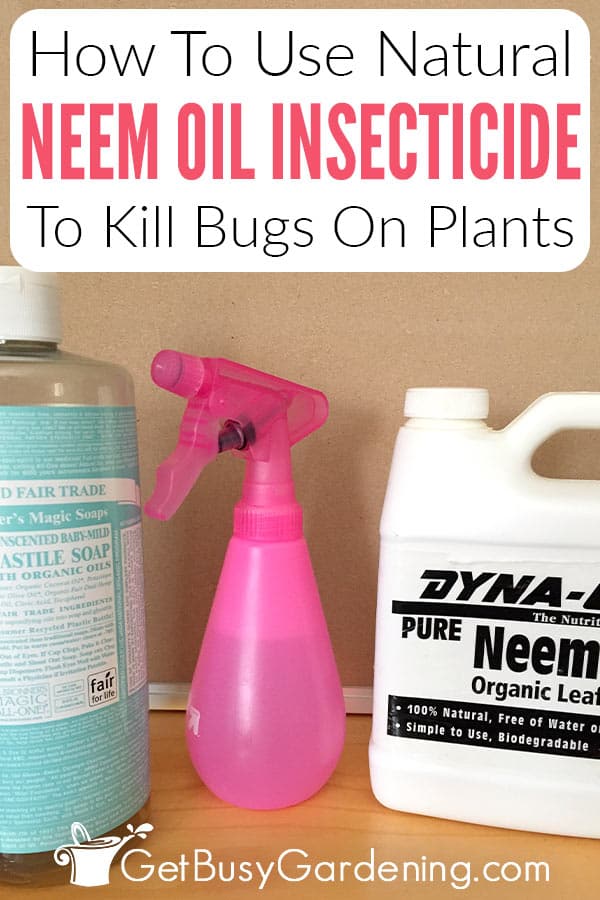
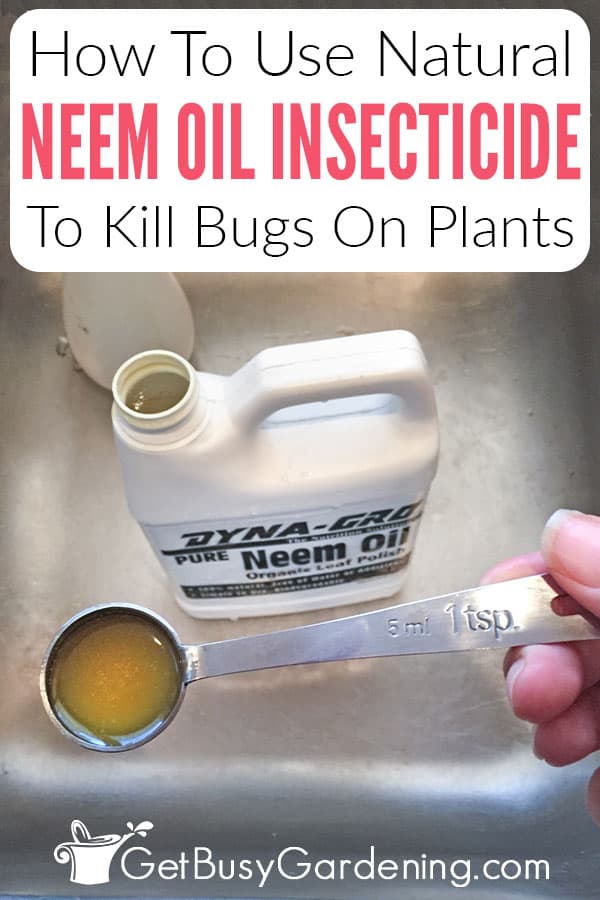
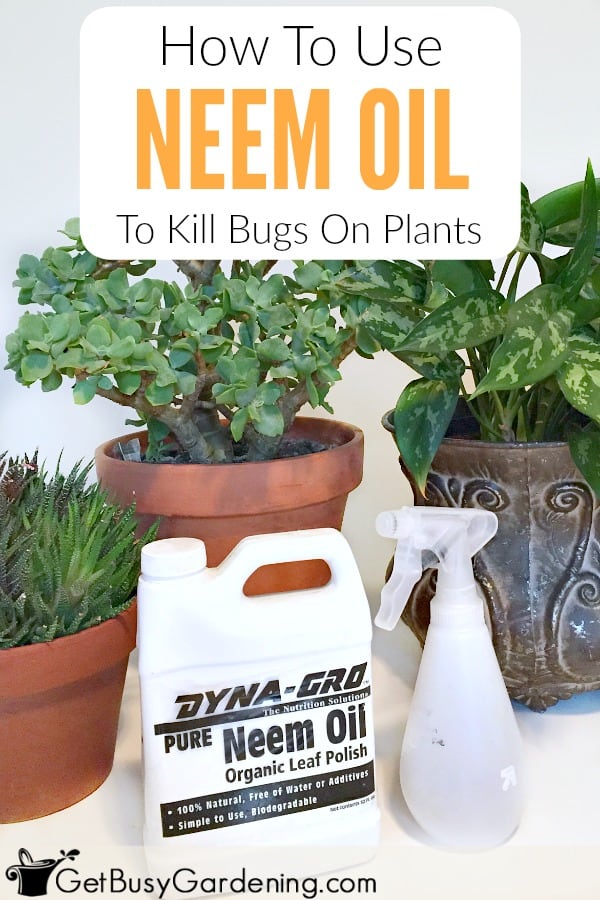
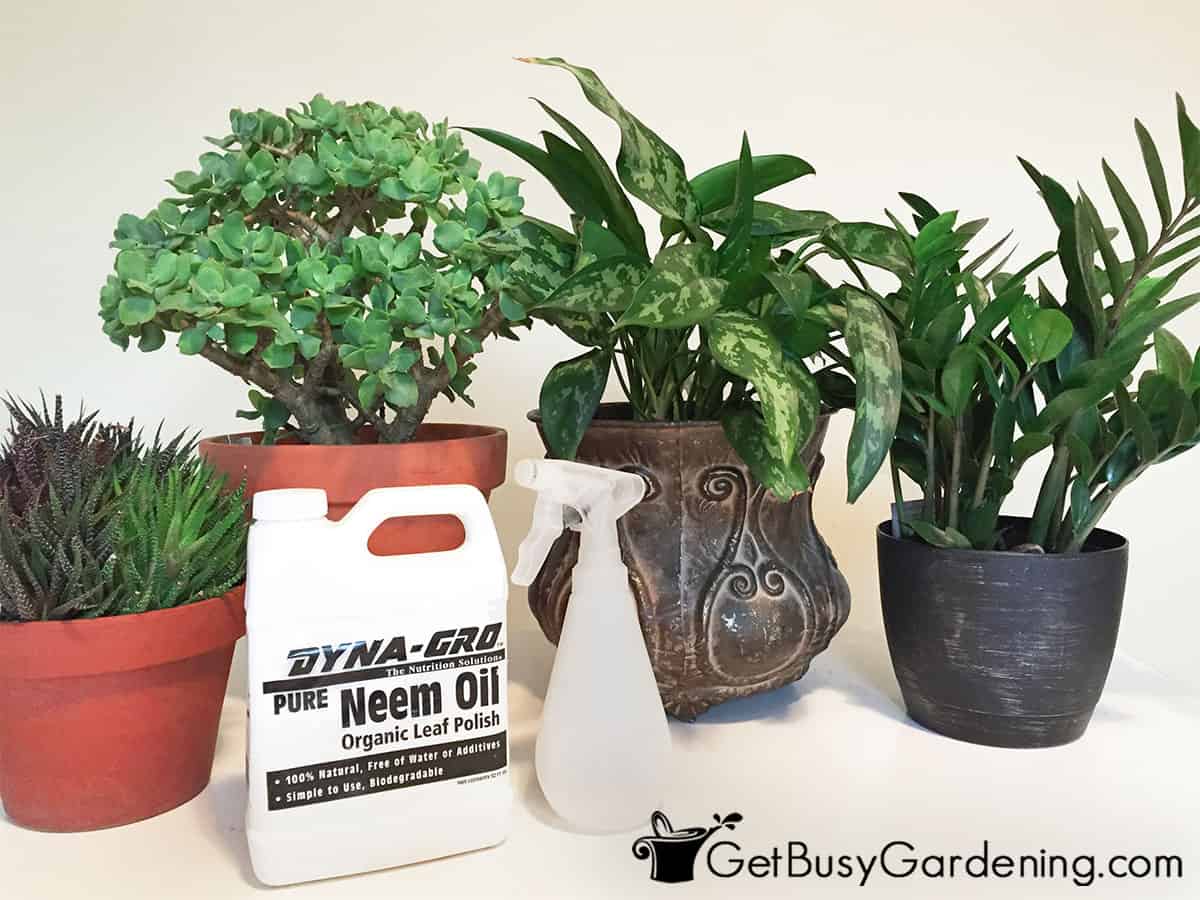

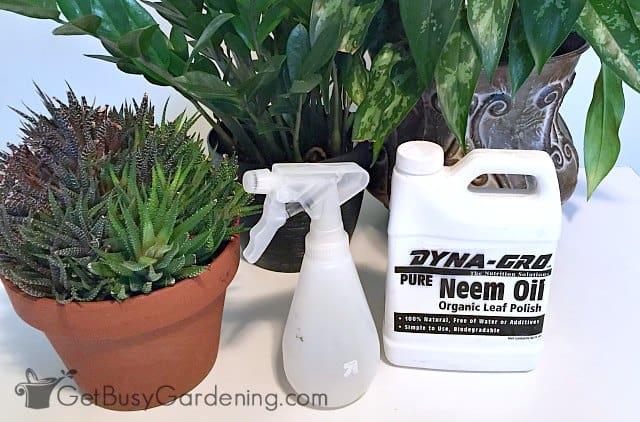
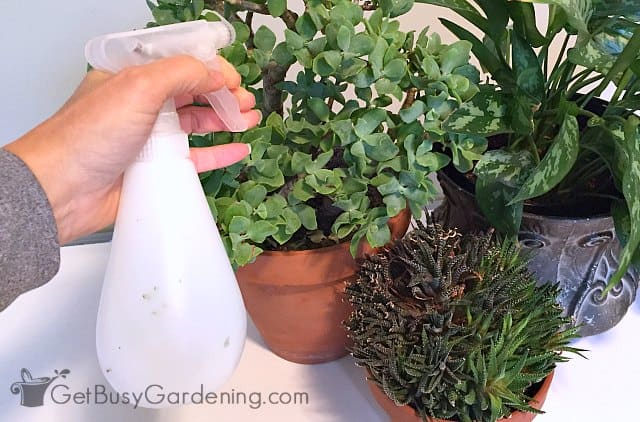
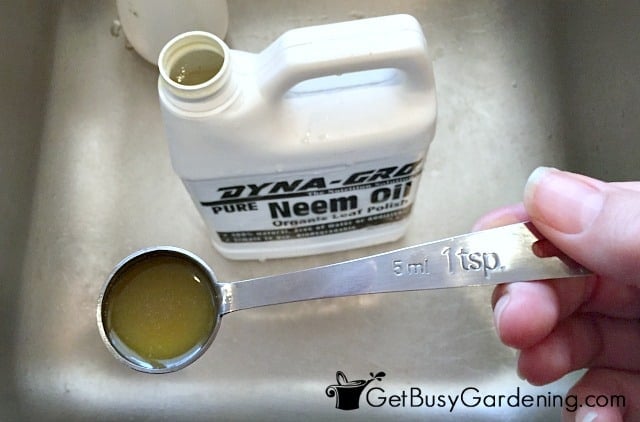

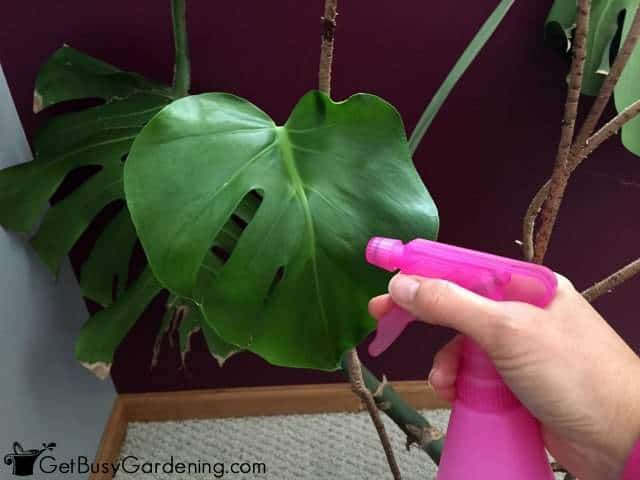
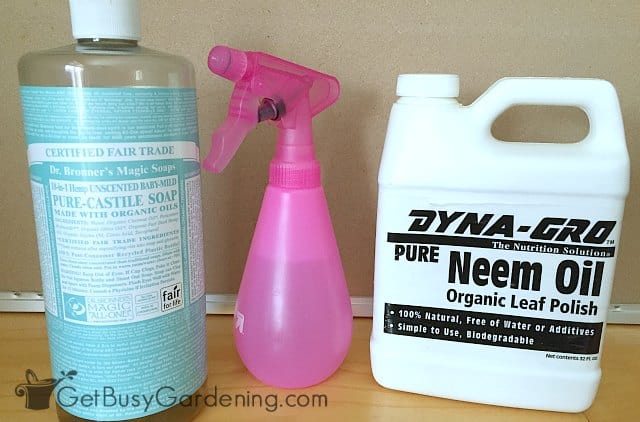
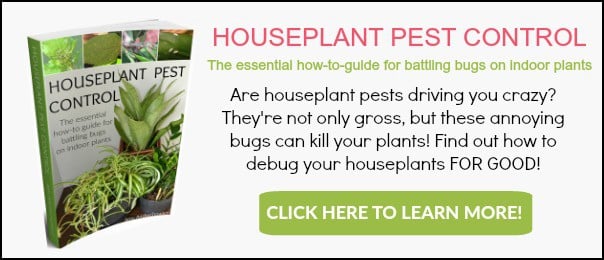

Swami Nathan says
Glad to see neem oil in use as far as USA ! , We use it in our garden as a insecticide and fungicide ,It is very effective on Hibiscus (White powdery infestation). We also use neem cakes(a by-product of Oil pressing) as fertilizer/insecticide to prevent root infestation. The only downside is the odour . Brings back memories of childhood days when I had to swallow fresh ground tender neem leaf ( used to deworm).
Amy Andrychowicz says
Yes, I agree, neem oil doesn’t smell very good! But it doesn’t bother me, since it works so well to get rid of all those plant-eating bugs! 🙂
Tara says
Hello Amy (again), thank you so much for offering this Q & A. As I continue to battle my fungus gnat house plant infestation, I wanted to check w/you on your mention of using Neem oil as a primary water drench. I have replied in earlier correspondence that I have been using BTi up until this point (4 drenches so far over the course of a month in a half). I just started using ‘Garden Safe’ Fungicide 3 spray. I got it before I found this post of yours on Neem oil concentrate w/baby soap added to mix them. Anyway, BTi is not fully effective as I thought it should be right now. Should I switch to Neem oil water drenches? I’ve noticed since using spray, less adults, but they still exist and can see them crawling over top of soil of plants. Thanks in advance for any recommendations, obviously I’m hanging in there, i’m hoping to beat them once and for all! Never give up! 🙂
Amy Andrychowicz says
Yes, neem oil works great as a natural pesticide. But be careful with your soil drenches, because if the soil in your plants is staying wet all the time, it’s not only bad for your plant, it’s a breading ground for fungus gnats (especially if the other pesticide you’re using doesn’t have a residual effect). Neem oil does have a residual effect, so it can work to kill those pesky bugs for good, but I would definitely allow the soil on your plants to dry out before drenching it again. GnatNix is also a wonderful product to get rid of fungus gnats without having to continuously drench your plants soil. Also, you said you’re trying a “fungicide” spray too, but I think maybe that’s a misprint and you meant to say pesticide?… fungicide is for killing fungus and mildew, and won’t work to kill bugs.
Tara says
Hello! Happy to report that neem oil is wonderful! I have used it along with the remaining BTi to kill all stages of fungus gnats and WOW, what a difference! I can honestly and happily report to you that I have turned the corner on the infestation and it GONE! In fact, I really attribute the neem oil in helping the most if not all the infestation (not sure the other worked, maybe only on larvae stage, hence why it took so long to get them under control). The spray I mentioned has .09% neem oil w/in it and it worked. It has other components too for the fungicide etc. Next time though, will invest in straight neem oil w/baby soap so it mixes well. Thank you so much for your helpful advice! I am going to purchase your book too, will be great to have on hand for future problems. My plants are looking great and I cannot believe I actually won the war against fungus gnats! Thank you, thank you, thank you!
Amy Andrychowicz says
Woohoo, so happy to hear that the neem oil worked to get rid of your fungus gnat problem, thanks for following up!! Congrats!
Kitty Martin says
I have sprayed my ficus tree 3 times with Neem oil spray. The concentrate says to only mix with water, not soap. My ficus still has those darn little black bugs that make the leaves curl up. Plant has lots of new growth and trying hard to survive. Plant is on balcony and spraying the Neem oil spray makes a huge mess. I’m on 7th floor and not allowed to rinse it off with water so have to mop each time. Back issues so difficult. I only have Dawn and Dove body wash. Would that be mild enough to use with the Neem oil?
Amy Andrychowicz says
The bugs you describe sound like spider mites, here’s some info that could help you get rid of them… How To Control Spider Mites On Your Houseplants
Yes, my guess is that your neem oil treatments aren’t very effective because oil and water don’t mix… so you’re probably mostly spraying water on your plants, and the neem oil is staying in the bottle. Adding soap will help them mix, and make your treatments much more effective. However, I can’t recommend using body wash for the soap because I have never tried it myself, and I don’t know if the type you have will harm your plants. Body washes usually have lots of additives, like perfumes, lotions and oils that could end up causing more problems with your plant. I also don’t recommend using Dawn because it contains chemicals (like detergents and degreasers) that can be harmful to plants as well. Try to find an organic or more natural soap that doesn’t have all those additives, Dr. Bronners Baby Mild liquid soap is my go-to.
Jane Newman says
I was wondering if Neem oil can be used on fleas inside the house? I know you can use it as a pain medicine for insect bites after an animal is bitten but what about as a deterrent.
Amy Andrychowicz says
Sorry but I’m not sure.
Casieopea says
Neem oil can be a lung irritant so I would be careful spraying it all over your house as you would need to for flea eradication.
Diana Black DuVall says
I have petunias, herbs, and roses planted in separate containers on my patio and I’m dealing with aphids on the roses and slugs and caterpillars on the petunias. I’ve also got some brown spots and basil bugs on my basil that has been flourishing until now. I’m going to put ground eggshells into the petunias with slugs but would the neem oil help with the caterpillars and aphids? And what can I do for my poor basil plant? Thank you!
Amy Andrychowicz says
Neem oil will definitely help to get rid of the caterpillars and aphids, but be careful using it outdoors on flowering plants because it can also kill bees and other beneficial insects if it’s sprayed directly on them. It won’t harm beneficial insects once it’s dry, so it’s best to spray the plants in the early morning or evening when the bees aren’t active.
Homes In Desert says
I selected Neem Oil over Sven to combat Aphids on my outdoor Hibiscus plants. Today, is the second spray. The brand I bought says to apply a seven to 14 day treatment. I notice that when I cutback the Hibiscus plants that the Aphids came to visit. Stress could be the reason. Living here in the California Desert you expect the unexpected. Q? Do you know of any reason not to apply for seven days in a row? Any other tips appreciated too. It’s that bad. Thanks.
Amy Andrychowicz says
I would definitely follow the instructions on the label. Neem oil works like a charm to keep pests off my hibiscus, so it should work great for yours too. To help speed things up, you can try washing the leaves with a mild soapy water and rise it well to get rid of most of the aphids. The neem oil will kill them too, and has residual effects to keep them from coming back… but it can take a few days before you notice a difference on a heavily infested plant. Definitely don’t use any type of chemical pesticide on aphids, they can become resistant to chemicals very quickly.
ELMY says
Hi Amy, I have lost some plants to white flies, mealy bugs and spider mites and am still battling them from the remaining surviving plants. I’m not sure if the dishwashing detergent I have is suitable. However, I do have baby bottle cleanser which can be used to wash vegetables and fruits as well. Can it substitute the dishwashing liquid soap to rid the mealy bugs and spider mites? And do I need to rinse off after spraying the plant with the solution?
For routine maintenance, do I just use neem oil mixed with water or it’s neem oil with some soap mixed in water?
look forward to your advice. Thank you.
Amy Andrychowicz says
You can use a mild dish soap, but I don’t recommend one that contains detergent or degreaser. No, don’t rinse your plants after applying the neem oil solution. You need to mix soap into the neem oil/water mix because, since water and oil don’t naturally mix together, soap will help get them to mix.
Dee says
We get white flies year, so I’m trying this!
Sherry says
Can I use neem oil on a jade plant? My jades have been outside for the summer and I want to bring them in without infecting other plants! I’ve heard that neem oil or Murphys oil soap can harm jades and cause them to suffocate from the oil. Is this true? What should I treat a jade with for scale? They also look like they have some kind of fungus on them. It’s a white fuzzy patch (not mealy bugs) and underneath the patch its all brown. Not sure if I should go straight to liquid sevin or not! Thanx so much for any advice! I have an indoor greenhouse and don’t want to bring anything in!
Amy Andrychowicz says
Yes! I have used neem oil on my jade plant before, with no problem. So it should be safe to use as long as you buy the pure oil (with no other chemical additives that many companies put in). The stuff I buy (shown above) is organic, and pure neem oil. Follow the directions on the label to use it on your plant. I would test it on your jade before spraying the whole plant, just in case. Spray a few leaves and leave it for a week and make sure the spray didn’t cause any damage.
Jade plants can get powdery mildew and other types of mildew too, so that’s probably the white stuff. The neem oil spray should help with that too, but it’s good to remove the heavily damaged leaves so that it won’t spread to the rest of the plant (unless all the leaves are already infected, don’t remove them all! 🙂 ). Here’s a post I wrote about scale… Controlling Houseplant Scale
Sherry says
Amy, Thanx for all your valuable info. I just bought your e-book for battling bugs on indoor plants! Do you use Neem oil on even your succulent plants too? Do you also ‘wash’ them in the tub of soapy water and neem before bringing them inside for the winter? It seems like they would get way too wet after submerging them for 10 minutes or so and get “rot” from being too wet! OR do you just use a spray bottle on the succulents with the neem and soap? Thanx, you’re a great help!
Amy Andrychowicz says
You’re welcome Sherry, thanks for buying the e-book! I hope you love it! Yes, as long as you get pure neem oil (like the kind I show in this post) and then dilute it yourself it should be safe. If you’re worried, just spray it on a few leaves to test it out and give it a few days to make sure it doesn’t cause any damage. Be careful about what type of soap you use though. Use a mild liquid soap (like the one I mention above), because soaps with detergents and degreasers can cause damage to plants.
I soak my plants in a tub of soapy water to debug them before bringing them inside (How To Debug Plants Before Bringing Them Indoors). I do this with all my succulents, and haven’t had a problem with them rotting. Make sure to allow the soil to dry out completely before watering them again, and only do this with plants that are in pots that have drainage holes. Also, be sure to allow the water to drain completely from the pot. I don’t put neem oil in the water when I soak the plants. I only spray neem oil on plants that are prone to pest infestations, or when I see the first signs of an infestation.
If you’re too nervous to try that method, you can simply wash the plants and give them a good hose down before bringing them in. But again, make sure they have plenty of time to drain. Of course, if you want you could spray them all with neem oil (after testing it on a few leaves). But it can be a bit stinky when you spray everything at once. 🙂
James says
I’m having aphids and many other infestation on super hot chili plants been using neem with soap mix nothing seems to get rid of them peppers aren’t at
Amy Andrychowicz says
Neem oil works great to get rid of aphids on pepper plants, but it’s a process, not a one-time fix. You need to keep treating the plant until all signs of the bugs are gone. Persistence is key.
Barb says
I am going to try and buy it local and use it on my grapes for Japanese Beetles anyone ever use it for those critters and did it work?
Dalia Lastra says
Yes I came home from a long trip and all my plants were infested with Japanese beatle bugs, I sprayed them with need oil and caught as many has I could and drowned them in soapy water after two days they were all gone but my neighbor who doesn’t take advice had swords on his fruit trees. This year I’ll spray before I leave town to be safe.
Barb says
I love the neem oil worked great on the Japanese beetles and the grapevine beetles
Brad Gregory says
Its is mealy bugs.I poured a solution of 3-1 from lowes.Well sees if it works.
Amy Andrychowicz says
Oh bummer!! Chemical pesticides don’t usually work on mealybugs, they are immune to most chemical pesticides. I would stick with the Neem oil and also work to dab the mealybugs off with a cotton swab soaked in rubbing alcohol. In time, they will die off. Good luck!
Brad Gregory says
I sprayed neem oil on my hibiscus and heard it was bad for them.The bottle never gave an accurate description
of the mixture ratio?So i poured a small amount of neem oil in a water spray bottle with dawn dish soap and sprayed it on a white infestation(possibly scales) causing harm to my hibiscus plants.What should i do next?
Did I cause harm to my plants?
Amy Andrychowicz says
Are you sure it was the neem oil that caused the damage? I’ve never had an issue spraying it on my hibiscus. It could be the bugs cause the damage. Sounds like it could be mealy bugs.
Casieopea says
dawn is a detergent, not soap. detergent can cause damage to delicate plants.
Jenna says
Thank you! The interesting part is that the majority of the leaves that turned yellow, didnt fall off. I picked them off. The bush still has approx. half of its leaves and is looking better this week vs last. I do see small fruit fly type flies sometimes around the plant and there is definately some sort of little worm in the soil, they are very tiny. Im assuming they are from the soil that the plant came with in its original pot cause i only used potting soil when I replanted it in the summer. Do you have any concerns with these details and do you suggest I give the plant any nutrients or miracle grow or anything???
Amy Andrychowicz says
Those bugs you describe are fungus gnats (also called soil gnats). Here’s a post I wrote about how to control those… How to Control Fungus Gnats.
Don’t fertilize it during the winter, maintain it in its semi dormant state. Once it gets used to being inside, you should start to see new growth and it will probably even flower for you this winter.
Jenna says
I have used neem oil to combat aphids and spider mites on my hibiscus. My plant sits in front of a window so I sprayed it in the evening. i have never used it before so I sprayed as much of the plant as I could, cause I read it only kills aphids if it hits them and I had aphids all around the flower buds and underside of my hibiscus flowers.
It is approximately one week later and there are no buds on my plant and i have about half of the leaves have turned yellow….help! did I just shock the plant? could it be that the sunny window the next day fried the leaves or is it safe once it dries on the plant?
This is my first plant I have taken in the house in the fall, and I did not know I needed to give it a good water soaking before I brought it in! It did not have aphids outside and was flourishing. It actually did well and was blooming tons till I sprayed it with the neem. Please keep in mind that it is November, and I think this plant also can go “dormant” at certain times of the year but the fact that I sprayed it last week seems important.
any advice?
Amy Andrychowicz says
It’s not uncommon for a hibiscus to start dropping it’s leaves and buds once it comes indoors in the fall – and like you said, hibiscus plants will start to go dormant for winter. I would make sure that you are watering it consistently (don’t overwater though), and keep an eye on it. The sun coming through the window at this time of the year probably isn’t strong enough to burn the leaves. I’m guessing that the shock of moving indoors is what’s causing the yellow leaves, and not the neem oil.
Good luck,
Amy
Sharon says
Neem oil seems to work well at combatting black spot on my roses, as well.
Amy Andrychowicz says
Oooo, good to know! I’ll have to give it a try.
debasish patra says
yes it will works as both fungicide nd insecticide..
James Missier says
I tried eradicating scale insect which is a menace to my orchids and mealy bugs to some of my plants which they keep coming back.
Then I tried using neem oil and light soap for the mixture.
I got it from an Indian store which sells it very cheap – like a sundry price.
And it worked so far..
The only setback – there is this oil fragrance that is a bit repulsive.
Amy Andrychowicz says
Glad to hear you had success using neem oil! It does have a strong smell, but it goes away after a few minutes, so it hasn't bothered me too much. At least you know it's not a toxic substance you're breathing in, that's a good thing.Amy
alan steel says
what is the proportions of the mixture of neem oil & soap for control of mealy bug, is it diluted with water? several of my plants are infested with the pests.
Alan
Amy Andrychowicz says
Follow the instructions on the label. It depends on how concentrated your Neem oil is.